Dental Implants Resource Guide
Your Guide to Dental Implants in Boise, Idaho
Home / Procedures / Dental Implants / Dental Implants Resource Guide
Dental Implants Table of Contents:
- What Are Dental Implants?
- Who Can Benefit from Dental Implants?
- What Are the Advantages of Dental Implants as Compared to Bridges or Dentures?
- What Are the Three Parts of Dental Implants?
- What is the Process of Getting Dental Implants?
- What is the Post-Op Recovery for Dental Implants Like?
- What Foods Should You Avoid Eating When You Have Dental Implants?
- What Are the Difference Between Full Mouth, Multiple Teeth, and Single Tooth Dental Implants?
- Are Dental Implants Covered by Insurance?
- What is the Best Way to Care for Dental Implants?
- What Are All-On-4 Dental Implants?
- Feel Confident with Your Smile Again
- Contact Boise Oral Surgery and Dental Implant Center
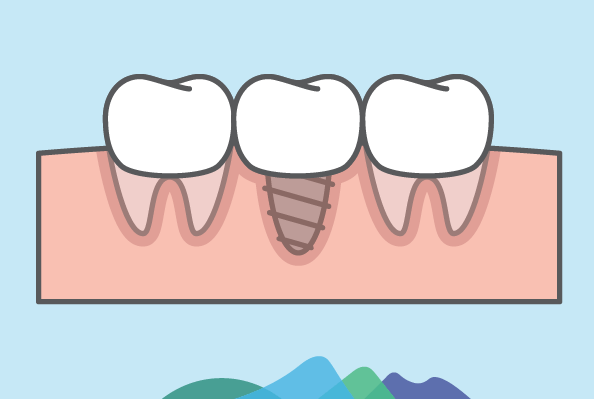
What Are Dental Implants?
If you feel self-conscious about missing or damaged teeth, dental implants can help restore your smile and give you a much-needed boost of confidence. Dental implants are screws, usually made from titanium, that act as roots, anchoring artificial teeth to your jawbone, giving you a natural look. Dental implants are as close as you can get to natural teeth, and they function much the same, meaning that in most cases it is difficult for people to tell that you even have them. Dental implants can help you feel more confident and comfortable not only with your smile but your overall appearance. They can improve the overall function of your mouth, so you can go back to doing things you may have been too embarrassed to do, as well as eating foods you stopped consuming prior to dental implants.
Though you need to get dental implants placed by an oral surgeon, this surgery is routine and generally safe for nearly everyone. When dental implant surgery is performed correctly, and you care for your dental implants properly, they can last you a lifetime! It is important to find a trustworthy and experienced oral surgeon to perform this procedure, so you know you will be getting quality dental work.
Who Can Benefit from Dental Implants?
Millions of Americans have missing or damaged teeth. Tooth decay, accidents, injury, and periodontal disease are all leading causes of tooth loss. Many people with tooth loss issues may have trouble eating, or may feel uncomfortable when smiling, laughing, or talking to people. Over time, tooth loss can have a big impact on your self-esteem or may affect your diet and overall health.
The good news is that there is an effective solution for those who are affected by tooth loss, and the technology surrounding tooth replacement is constantly advancing. Most people who have experienced tooth loss can benefit from receiving dental implants. In general, if you are healthy enough to undergo a routine surgical procedure, you can be a candidate for dental implants. Of course, every case is unique, so it is important to consult with an oral surgeon that can review your case and give you the best options for dental implants based on your unique situation.
What Are the Advantages of Dental Implants as Compared to Bridges or Dentures?
For many years, bridges and dentures were the only viable solutions available for people who were missing teeth, however, these procedures can sometimes lead to complications over time. Bridges and dentures are still commonly used in many applications, and your oral surgeon can help you decide which option is right for you, but dental implants offer several advantages over other tooth replacement solutions. Though they can be a bit more expensive than other solutions, they are the most durable and natural-looking options available.
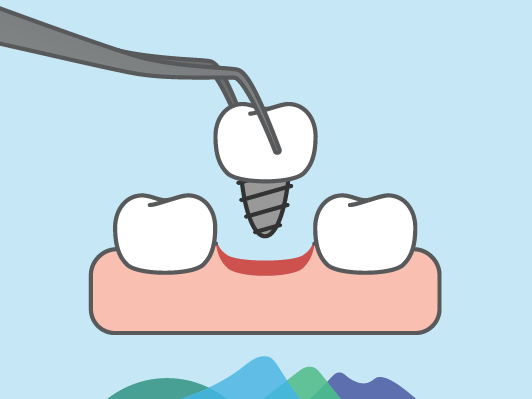
A dental bridge attaches to the healthy teeth surrounding a gap in your smile, but this can put extra strain on the teeth they are attached to, which can further weaken the structure of the jawbone. Dental implants, on the other hand, use titanium screws to improve the strength and structure of your entire jaw. Dentures are another common solution for people missing teeth, and unlike dental implants, they can be removed. But this often leads to dentures slipping when you talk or eat certain foods, they need special care, and some people find them uncomfortable. Dental implants are a more long-lasting and low-maintenance option, and they stay put after they are placed.
What Are the Three Parts of Dental Implants?
The dental implant that the oral surgeon will place in your mouth is comprised of three parts: the implant, the abutment, and the crown. First, the oral surgeon places the dental implant, which is the titanium piece that screws directly into your jawbone. The surgeon cuts into your gum and drills a hole into your jawbone and then inserts the titanium screw. From there, it may take some time (up to several months) for the jawbone to completely fuse with the screw.
After the jawbone is fused with the screw, an abutment is placed. During this part of the procedure, your oral surgeon opens the gum once again to place an additional piece onto the screw. This is the piece that will eventually attach to the crown. You will need about two weeks for your gum to heal after the abutment is placed and before the crown can be added. Finally, after taking molds of your other teeth, your oral surgeon will create your custom artificial teeth and place them into your mouth.
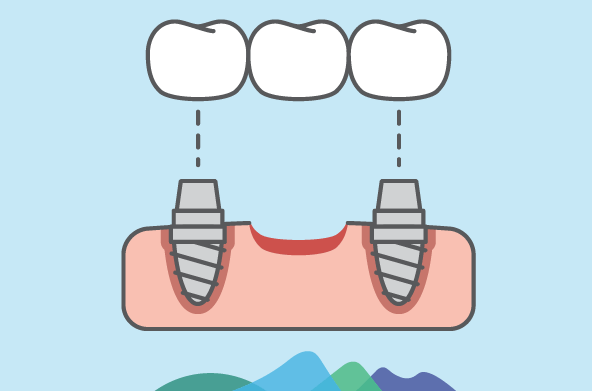
What is the Process of Getting Dental Implants?
Damaged Tooth Removal
The first step in restoring your smile is removing all the broken or damaged teeth that are causing you problems. Tooth extraction is a common procedure and can be performed quickly in your dentist or oral surgeon’s office. If you need to get several teeth removed, your surgeon may want to space the extractions out over multiple visits, but if you’re only getting one or two removed, it’ll only take one visit to safely remove the teeth. Your surgeon will likely use a local anesthetic like Novocaine to limit the pain you feel during the procedure, and you will be able to make a quick recovery afterward.
Jawbone Preparation
Jawbones need to be strong in order to keep the dental implant in place. After all, our jaws do a lot of hard work every day when we are chewing and talking. In some cases, your oral surgeon might recommend that you get a bone graft if they think your jawbone is too thin or soft to support the dental implants. People may have jawbones that are soft or thin because of factors like periodontal disease, age, or genes.
During a bone graft, your oral surgeon may take a piece of bone from another part of your body, though, in modern times, it is more likely they will use a grafting material made from animal or synthetic bone. Then, during a minor surgical procedure, this material is grafted directly onto your jawbone. This graft creates prompts your body to create new, strong bone that can help hold your dental implant in place. If your doctor recommends that you get a bone graft, it can sometimes take a few weeks or months for your body to grow the new bone necessary to support your dental implant.
Dental Implant Placement
Getting the titanium dental implant is the first, and usually most invasive step of the procedure because it requires opening up your gum and drilling a hole into your jawbone. The dental implant needs to be placed deep into your jawbone because it is serving as the root of your new tooth, so it needs to be able to provide a sturdy foundation. Because it may take a few months for the titanium implant to fuse with your jawbone and for your crown to be placed, you will still have a gap in your smile. You may receive a temporary removable denture to cover the gap for cosmetic purposes.
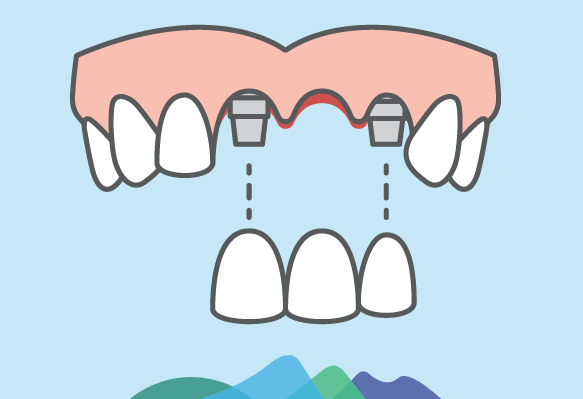
Bone Growth and Healing
During the weeks after the dental implant is placed, your jawbone needs plenty of time to strengthen and heal. The bone grows around the dental implant in a process that is called osseointegration. It’s important to give your jaw lots of time to fuse together with the titanium screw so that your dental implant will be strong and sturdy and will stay fixed in place for years to come.
Abutment Placement
After your jawbone and the screw are fully integrated, your next visit to your oral surgeon will be to place the abutment, which may require another minor surgical procedure. The abutment is the piece that your artificial tooth will be affixed to. You will receive a local anesthetic to numb the area around the screw, and your oral surgeon will cut open your gum to expose the screw and attach the abutment. Then, the gum tissue around the abutment is closed, leaving the abutment sticking out above the gum line. After the procedure is complete, you will need to let the area heal for a few weeks.
Artificial Tooth Placement
Finally, you are ready to get your new tooth, also called a crown. Your oral surgeon wants to make this tooth look and fit as naturally as possible, so they will take impressions of your entire mouth and remaining teeth. You and your oral surgeon can decide the artificial teeth that work best for your situation. Some artificial teeth are permanently affixed to the abutment, while others can be removed for cleaning.
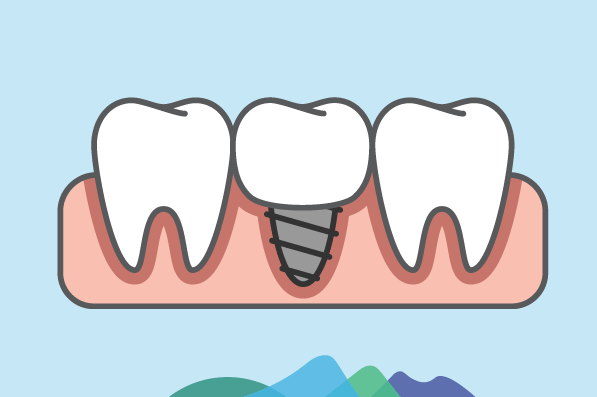
What Is the Post-Op Recovery for Dental Implants Like?
In some cases, your oral surgeon may choose to put you under general anesthesia for your dental implant surgery, though many oral surgeons choose twilight anesthesia instead. Recovery from general anesthesia may take up to an hour, and you’ll need someone to accompany you to and from the surgery to make sure you get home safely, which twilight anesthesia requires no recovery time and you can drive yourself home after surgery.
For most people, recovery after dental implant surgery is fairly painless. It is common to experience minor discomfort in the first few days, but taking an over-the-counter pain reliever, or a pain reliever prescribed by your oral surgeon, can lessen this discomfort. You may notice some swelling around your jawline or on your gums, but this is normal and can be reduced by applying an ice pack, The surgical site will continue to heal over the next few weeks, and during this time, you’ll want to limit your intake of certain foods, as noted below. Recovery time depends on how many dental implants you are receiving at once and your overall general health.
What Foods Should You Avoid Eating When You Have Dental Implants?
In general, you can eat nearly anything with dental implants. However, in the first few weeks following surgery, there are a few things you want to avoid while your mouth heals from surgery. Stay away from hard or crunchy foods like potato and corn chips, apples, and carrots. Also limit foods that require a lot of chewing, like steak. Soft foods like scrambled eggs, yogurt, applesauce, and oatmeal are great options for post-op meals. Avoid sugary, alcoholic, and acidic beverages, and always drink from a cup rather than using a straw to avoid a condition called dry socket.

After you are fully recovered from your surgery, you can go back to regular eating habits. Keep in mind, though, that drinks like wine, coffee, and tea can stain dental implants, just like they do regular teeth, and sugary foods and drinks can promote tooth decay. Enjoying these foods and drinks in moderation is fine, but keep your consumption limited to prolong the life of your dental implants.
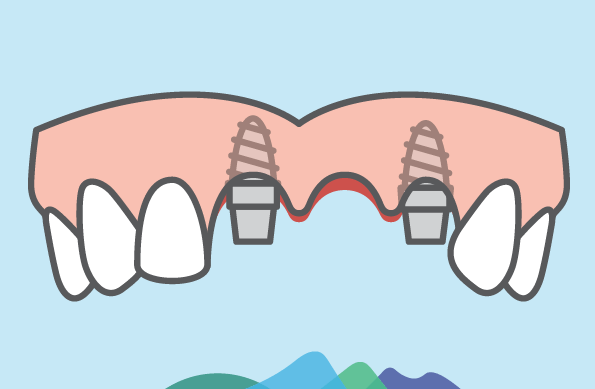
What Are the Differences Between Full Mouth, Multiple Teeth, and Single Tooth Dental Implants?
The entire dental implant procedure can vary in length and recovery time depending on how many teeth you need to be replaced. In most cases, each individual tooth that needs replacement will be given its own dental implant. If you have a large gap in your smile, for example, three or four teeth in a row missing, you may not need individual titanium screws for each tooth. If your oral surgeon can anchor the teeth on with fewer screws, they will likely do so, and will then use a dental implant-supported dental bridge or denture. If you are missing an entire set of teeth, either top or bottom, you may be a perfect candidate for all-on-4 dental implants, which are discussed in more depth below.
Are Dental Implants Covered by Insurance?
If you are considering getting dental implants, you are probably wondering if this procedure is covered by either medical or dental insurance. Unfortunately, some insurance providers consider dental implants to be cosmetic surgery and may only cover a portion of the procedure or may not cover it at all. It is important to talk to your oral surgeon and insurance provider to learn more.
Your dental implant surgery can be broken down into its major parts: tooth extraction, bone grafting, and placing the dental implant. Tooth extraction is a basic procedure that is usually mostly covered by dental insurance policies. Though getting a bone graft is often an essential step in making sure your dental implant surgery is successful, this is the portion that is least likely to be covered by insurance. And if your dental insurance covers major procedures, it may pay for at least part of the dental implant placement as well.
In addition, if your damaged or missing tooth is causing you serious problems, your oral surgeon may deem it medically necessary that you get dental implants. Insurance policies are more likely to cover procedures that are deemed medically necessary as opposed to procedures that are purely cosmetic. It is important to review your insurance policy to understand exactly what will be covered.
What Is the Best Way to Care for Dental Implants?
In many ways, caring for your new dental implants will be similar to caring for your natural teeth. Routine oral hygiene like brushing twice a day, flossing every day, and rinsing often is essential. And because dental implants sometimes do not fit into your jaw as tightly as natural teeth do, there is a chance that debris can occasionally get caught in the gaps. You can use a Waterpik water flosser or a rubber-tipped gum stimulator to safely and easily remove this debris before it causes any problems

When brushing your dental implants, use a soft-bristled electric or manual toothbrush. Though dental implants are durable, over time they can get scratched if you use a toothbrush or toothpaste that is too abrasive. Some kinds of toothpaste contain slightly abrasive ingredients, which is good for our natural teeth, but not so great for dental implants. It is a good idea to talk to your dentist or oral surgeon to see what kind of toothpaste they recommend.
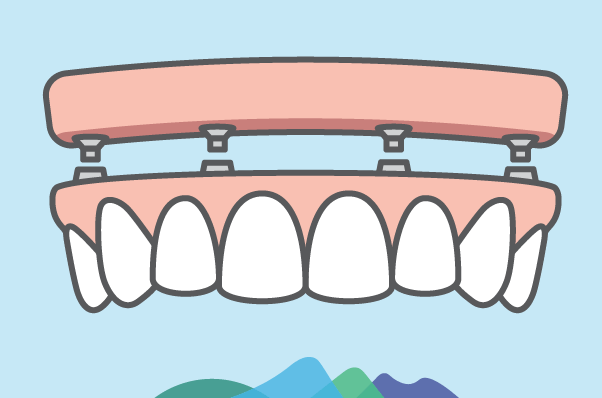
What Are All-On-4 Dental Implants?
Often, each tooth that needs to be replaced will get its own dental implant. This means if you are replacing six teeth, you will get six separate dental implants, abutments, and artificial teeth. However, if you are looking to replace an entire arch of either upper or lower teeth, an all-on-4 dental implant may be the right solution for you. This procedure places only four dental implants, which means you do not need a separate dental implant for each individual tooth. These four implants anchor the entire arch of teeth in place, and eight implants can restore an entire smile! All-on-4 dental implants are a great option if you have struggled with using dentures, as dental implants feel and function more like normal teeth, and require less care.
Feel Confident with Your Smile Again
It’s easy to see why dental implants are the preferred method of replacing missing or damaged teeth. They are natural-looking, easy to care for, and extremely durable. If you have been struggling with tooth loss, you are not alone, and there is a solution! At Boise Oral Surgery, we know how important it is to have your teeth looking and feeling great. Our experienced team is here to help you learn about what options are available to you as a patient, and we can help you see if dental implants are right for you.

Contact Boise Oral Surgery and Dental Implant Center
Submit a contact form or call Boise Oral Surgery and Dental Implant Center at 208-322-5522 to learn how they can help improve your smile. Boise Oral Surgery and Dental Implant Center offers long-term solutions to your complex oral health problems and are happy to answer any questions you have about wisdom teeth so that you can make the right decisions about taking care of your oral health. They offer a wide range of surgical services including wisdom teeth extraction, dental implant placement, bone grafting, oral pathology screening, and facial trauma surgery.
Patient Information
About Us
Our Boise Location
Boise Oral Surgery & Dental Implant Center
7910 W Ustick Rd Boise, ID 83704
Main: (208) 322-5522
Hours: Mon–Thu: 7:30 AM–4:30 PM
Fri: 7:30 AM–12:00 PM
© 2026 . All rights reserved. | Boise Oral Surgery • ID Specialty Dental Services, PLLC - Kevin Chad Lambourne, DDS.





